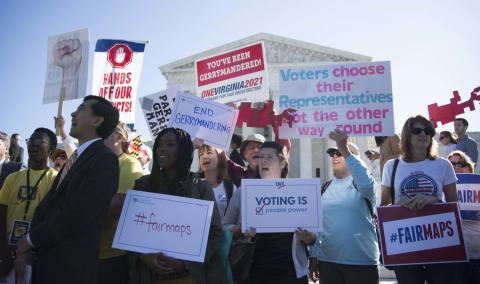All eyes in political reform circles are on the Wisconsin gerrymandering case (Gill v. Whitford) argued before the U.S. Supreme Court on October 3, 2017.
The case was brought by a group of Democrats challenging the redistricting plan adopted by the state legislature’s Republican majority and signed into law by its Republican governor.
The plaintiffs claimed that their constitutional rights to equal protection and freedom of association were violated because of the disparity between the vote totals of the two parties in statewide elections and the number of legislators elected by each party.
Plaintiffs claimed that their capacity to win a majority in the state legislature was unconstitutionally diminished relative to their Republican rivals.
It’s all about which party comes out on top. What about what’s best for the voters, what’s best for our democracy? What about an approach to redistricting that takes it from the parties and gives it to a nonpartisan commission?
California has such a system, and an effort is underway in Michigan to achieve such a reform through a ballot initiative.
Even if you accept the “common sense” notion that redistricting is a legislative matter and the courts have a role in making sure one party does not go too far in disadvantaging the other, the Democratic Party’s legal claim in Gill is dubious at best.
Plaintiffs argue that Democrats are being discriminated against because of their political beliefs. However, the redistricting plan was adopted like any other piece of legislation.
It is, of course, subject to challenge if it violates the constitutional right of a group of people (such as a racial minority) to equal treatment. Democrats, however, have no historic claim to such legal protection.
The 1965 Voting Rights Act does not go so far as what the Democrats are seeking in Wisconsin. While it has been used to give black candidates a fair chance of being elected, the statute does not ensure that their communities have commensurate power within the legislature itself.
Most redistricting challenges have involved race, or advantaging one group of voters over another on the basis of where they lived. The standard, "one person, one vote," means that you cannot give a rural district with 50,000 residents the same number of state legislators as an urban one with 250,000.
Seems fair, doesn’t it? However, as an independent, I have several bones to pick with judicial intervention to protect Democrats.
First, why should the courts concern themselves with maintaining a “proper” balance between the political power of the two major parties. If there are two bullies in the neighborhood, the rest of us deserve protection against them. One could hardly claim that the police have responsibility to ensure that one bully does not gain a tactical advantage over the other.
Forty percent of Americans self-identify as independents. Aren’t we entitled to be treated fairly as well?
At present, the system (including the drawing of districts) is so rigged that hardly any independents are elected to state legislatures or to the U.S. House of Representatives. Indeed, in many states, independents are barred from participating in primary elections altogether.
The extent of the special solicitude shown toward the major parties can be seen in how the lower courts have addressed the issue of standing.
Traditionally, in redistricting cases, the plaintiffs have needed to be residents of the districts where the gerrymandering discriminated against them. A resident of a district in New York City could challenge a redistricting plan that diluted her voting power, as compared to a resident of a district in rural Washington County.
Here, the Democrats are claiming vote dilution, based not on the makeup of the districts where they reside, but on the fact that the gerrymandering ensures that Republicans will control the state legislature even though each district has the same number of voters.
What about Catholics, or school teachers, or independents? Does each such group have the right to be equally represented in the state legislature?
Voting rights are about access to the ballot, not ensuring a particular outcome. So long as everyone has the right to vote and their ability to do so is not impeded by, for example, having polling places only in the white parts of town, isn’t the Constitution satisfied?
When it comes to judicial review of outcomes, we are on shakier ground.
Perhaps a case can be made that a structural framework such as gerrymandering that ensures that blacks, while allowed to vote, are never elected is of legal concern, given that the Constitution was amended to protect against race discrimination.
But the Constitution contains no such provisions protecting the rights of Democrats and Republicans. Indeed, it does not mention Democrats and Republicans at all. We can’t allow the parties to make us think as though their rights are the same as ours.
